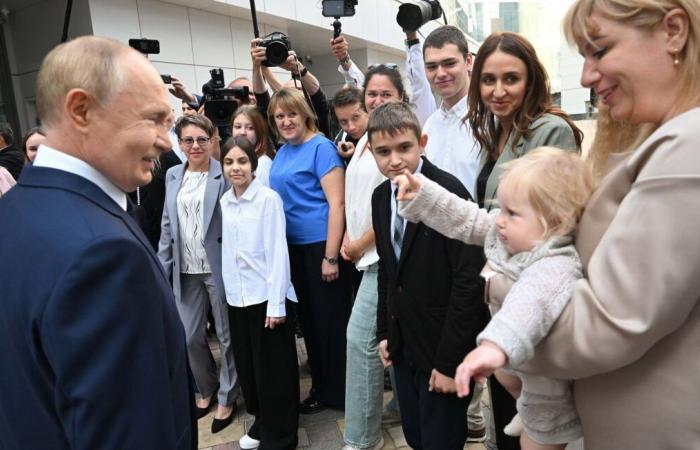A fine of 400,000 rubles (around 4,000 euros) and double that for civil servants. In Vladimir Putin’s ultraconservative Russia, this is what those who have the idea or desire to promote a “child-free” lifestyle risk. Russian MPs adopted a law on Tuesday repressing this position.
This text, voted unanimously – and which must still be adopted by the upper house on November 20 – is part of the shift in Russian power on social issues, taken since the invasion of Ukraine in February 2022 Political and religious leaders see in the defense of so-called “traditional” values an extension of Russia’s struggle against the West, accused of moral “decadence”. The rights of the LGBT community have notably been reduced to nothing.
A way of life banned from the Internet and media
The law also aims to respond to the significant Russian demographic decline which Vladimir Putin has never managed to remedy since he came to power a quarter of a century ago, and aggravated by the human losses of the Russo-Ukrainian conflict.
“A strong family has been proclaimed as a traditional value” in Russia in 2022, underline the authors of the text in an explanatory note. However, “one of the threats to traditional values is the promotion in Russian society of the “childless” ideology, which leads to a degradation of social institutions […] and creates circumstances for depopulation,” they assert. In the crosshairs of the promoters of the law, communities and groups which would expose themselves to heavy fines for doing what is described as the promotion of a “childfree” lifestyle and which would have an aggressive attitude towards “those who carry out their need to be a mother or father”, whether on the Internet, in the media and books, in films or in advertisements.
A demographic “catastrophic for the future of the nation”
In 2023, the fertility rate in Russia was 1.41 children per woman of childbearing age, far from the population renewal rate, according to estimates from the Russian statistics agency (Rosstat), cited by the economic daily RBC. In July, the Kremlin recognized a “catastrophic” situation for the future of the nation.
Russia does not communicate on its military losses on the Ukrainian front, but the conflict only accentuates this trend. According to Rosstat, 920,200 children were born in Russia between January and September 2024, a decrease of 3.4% compared to the same period of the previous year. According to Russian media, this is the worst toll since the end of the 1990s.
Limiting adoptions of Russian children
As part of this policy of defending traditional values, the Supreme Court has already banned the “international LGBT+ movement”, described as “extremist”. This vague wording opens the door to heavy prison sentences for those accused of adhering to it.
MPs also voted on Tuesday for a law preventing the adoption of Russian children by nationals of countries authorizing gender transition and change of marital status, now banned in Russia.
“In these countries, the situation is absolutely unacceptable for our children to be sent there,” commented the President of Parliament Vyacheslav Volodin, specifying that this had “concerned seven children in 2023”. “Today’s decision will result in all our children being adopted in their own country,” he said.






